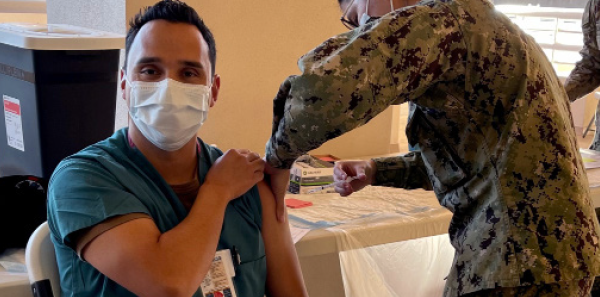
Editors’ Note: This article was accepted on Dec. 28, 2020, and was accurate at that time. Because information about SARS-CoV-2 and COVID-19 is evolving rapidly, please verify these recommendations and information.
Explore This Issue
ACEP Now: Vol 40 – No 01 – January 2021After witnessing more than 300,000 patients perish from COVID-19, including thousands of our health care colleagues, and despite record-setting hospitalizations in December, 2020 ended with a glimmer of hope: On Dec. 11, 2020, the Food and Drug Administration (FDA) granted emergency use authorization (EUA) for the Pfizer-BioNTech mRNA coronavirus vaccine, followed one week later by an EUA for Moderna’s version of the vaccine. At the time of this writing (Dec. 28), the Oxford-AstraZeneca adenovirus-based coronavirus vaccine had not yet received EUA from the FDA, though published data suggested efficacy ranging from 62 to 90 percent, with recent reports claiming even higher numbers.1,2 When the pandemic began, very few experts believed that an effective vaccine would be available so soon, making vaccines the high point of an otherwise dismal year for science and public health.
In the United States, the first wave of individuals to receive the Pfizer and Moderna vaccines outside of clinical trials has mainly been composed of health care workers. The “vaccine selfie” quickly became the meme of the moment, with many emergency physicians posting pictures and videos of themselves getting their first dose on social media for all to see. Naturally, the media covered a few instances of systemic allergic reactions requiring epinephrine, but so far, among the nearly 2 million doses given here, the safety reports have been encouraging. Many people experienced pain at the injection site, and a sizeable number, perhaps 3 percent, experienced symptoms bothersome enough to temporarily inhibit usual activities of daily life and work. But all of that pales in comparison to the more than 3,000 Americans currently dying daily of COVID-19 among those who have not yet been vaccinated.
Three Big Questions Answered
Over the next few months, we can expect three common questions: 1) Should I get the vaccine when it is available to me? 2) Should I be vaccinated if I was already infected with the coronavirus and I recovered? 3) Which vaccine is best?
The answer to the first question is easy in most cases: yes. Compared to getting COVID-19, which has killed 1 in 1,000 Americans already, the side effects associated with these “reactogenic” vaccines are minor. The answer to the second question is that those with suspected or confirmed previous infections should be vaccinated, though only after symptoms have ceased. (Note: It is possible that immunity from the vaccines will be stronger and longer-lasting than that from natural infection, though research is ongoing.)
Pages: 1 2 3 | Single Page




No Responses to “Common Questions About the Pfizer-BioNTech and Moderna COVID-19 Vaccines”